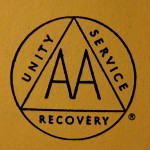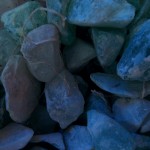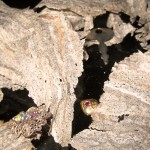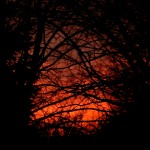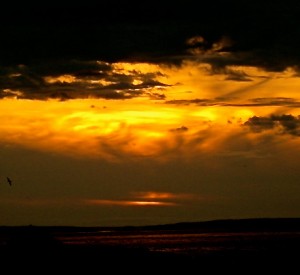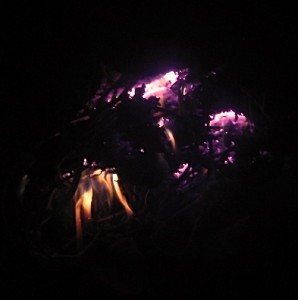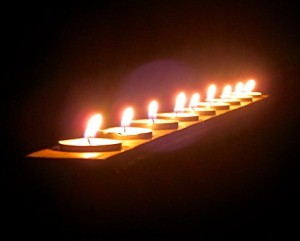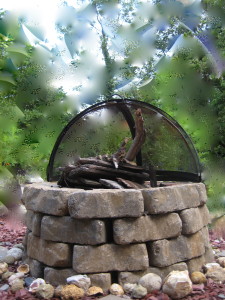
– Photo by Jan Ketchel
After four sweat lodges and several days on a vision quest, Jonas Elrod—the seeker who made the documentary Wake Up that Jan references in her blog earlier this week—reaches out to God, as throughout his quest his concept of God has constantly changed and now he is befuddled. He begs for clarity on the meaning of God, of religion, the correct path, etc., and is met with a vision of fingers pointing at a bigtop tent. He sees that the tent is empty, the posts fall down and the tent collapses. This vision is accompanied by the words: “All pointers point in the same direction.” He understands that what he seeks has nothing to do with religion or church, that there is no life, or only the illusion of life, inside the tent, inside the church. Inside the tent there is nothing.
Jung unmasked the same truth about modern religion: dogma and ritual are dressed in archetypal wrappings with no life inside them, no pathways to spirit. In his youth, Jung had a powerful dream where the heavens opened up and dropped excrement upon the church steeple. He was to spend the rest of his life carving a pathway to spirit for modern humanity.
Jung journeyed through the ancient religions, East and West, in search of valid pathways to the soul. He, like Joseph Campbell, discovered that religious symbolism and practice were relative to the time and place of their emergence. The gods and saviors of one era were merely local masks or pathways to spirit that fit the style and custom of those times. Evolution, however, requires that new pathways emerge, relevant to changing times. All religions that cling to the images of another time cannot support or transport the modern soul to its destiny and fulfillment.
Jung’s greatest discovery was that connection to spirit lies not in attachment to some mask of God, but in direct contact with spirit in numinous experience. Jung’s process of psychotherapy opens the door to direct encounter, direct experience, direct communication between consciousness and the greater self—Spirit—to arrive at healing and fulfillment. The challenge for all seekers and initiates, of all times, is to take the journey into the unknown—like Jonas Elrod did—to become heroes in search of their souls. Such a journey means encountering, confronting, and slaying all the energies that lie in the unknown, in the form of sensations, intense emotions, and powerful beliefs and images.

-Photo by Chuck Ketchel
In our time, the quest for wholeness with spirit has been largely projected outwardly onto materialism, romanticism, and consumption. As a consequence, spirit has lodged itself inside the empty circus tent of consumerism on a grand scale, in the empty search for romantic love, in the desire for more, and in the addiction to substance. Modern humanity is compelled to seek its wholeness in the tent of emptiness. Spirit is behind this, but as a trickster now, ravaging us with knocks of the spirit as we relentlessly grasp for our wholeness in that which shines with promise.
Spirit comes in the form of the trickster because it needs to meet us where our projections are caught. It’s the only way we can engage it, so it meets us where we are. If we are bent on romantic love that’s where spirit will meet us. It has to have us wake up to our fixation—that’s not a judgment. God comes in the form that God comes in, to wake us up. Hence, the emptiness of the tent, because that’s where we all are. It’s only through fully grasping and crushing in the emptiness, in collapsing that empty tent, that we will be forged for the next step of the journey—direct experience within.
Bill W., ultimately through a connection with Jung, had his direct experience in a vision that lifted his thirst for spirit without—from “spirits”—to spirit within, to inner union and wholeness. AA was founded on direct contact with spirit, with the mask of spirit unmasked. As spirit is freed of its empty substance container, it is brought home, inwardly to self. Thus, AA works as a valid religion when its adherents find their way to direct experience and union with spirit within. Short of that, AA leads only to control of dry spirits.
Jung warned against the seduction of adopting the garbs of exotic practices and ritual as a replacement for empty local religions. He frowned upon yoga and Buddhism replacing religion in the West. Though I think his warning is valid, he himself used yoga to withstand the energies of the collective unconscious as he went deeper into his own night sea journey. The message being: take what works, but go inward and do the work there rather than wearing it outwardly.
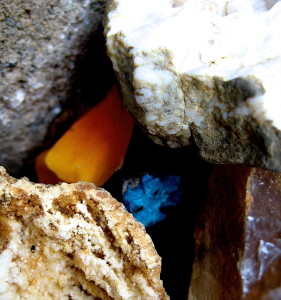
– Photo by Jan Ketchel
The key to direct experience lies in the methodologies, not the wrappings of many ancient traditions. Witness the sweat lodge and the vision quest in Wake Up.
So do engage in the practices of yoga or the meditation techniques of Buddhism, the prayers of many traditions, and the many worlds of dreaming, or whatever works for you.
When Carlos Castaneda would discuss the Magical Passes of Tensegrity, he’d exclaim: “Suspend judgment! Just do it and see what happens!” In other words, avoid the trappings of faith, belief and deity. Just do the techniques, and see what happens: Communion, or not?
Furthermore, if your spirit lands somewhere in the circus tent just accept it. You must pursue it until you unmask its emptiness—the direct experience of emptiness. This is what Jonas Elrod finally achieved during his own spiritual quest, the emptiness that led to his own direct experience.
From the emptiness of the circus tent, you may be ready to encounter spirit directly, in direct experience at home, in the depths of the self.
From in tent,
Chuck

